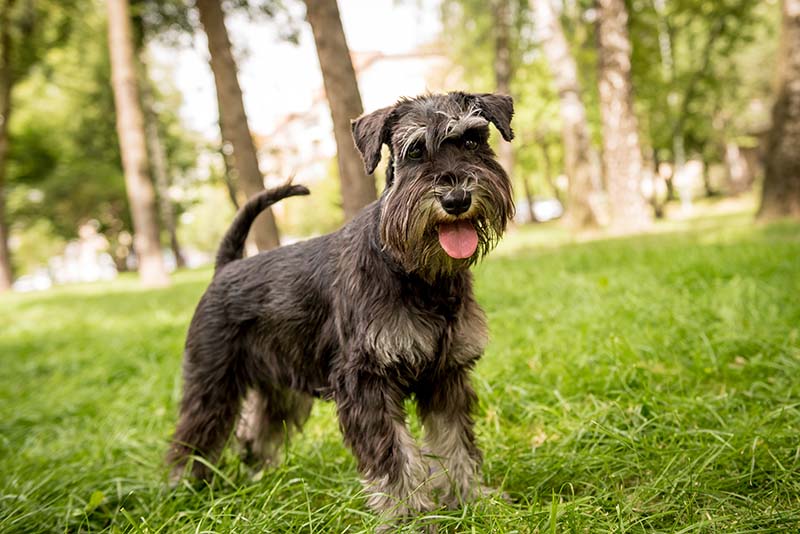Click to Skip Ahead
Miniature Schnauzers are spunky German Terriers with big personalities. Like other small breeds, these dogs can be long-lived, with some exceeding 14 years of healthy life.
Many factors can impact your Miniature Schnauzer’s lifespan, however, including its diet, general health, environment, and more. Find out more about a Miniature Schnauzer’s lifespan and how to keep it happy and healthy. On average, Miniature Schnauzers live about 12 to 14 years, with some reaching 15 or 16 years.
How to Help Your Mini Schnauzer Enjoy a Long Lifespan
Feeding & Diet
Miniature Schnauzers may be small, but they need a well-balanced diet to fuel an active lifestyle. There are many options for providing your mini Schnauzer with the best nutrition, and the best way to make sure the food you choose is giving them everything they need is to make sure it is approved by the Association of American Feed Control Officials (AAFCO).
Like any dog, Miniature Schnauzers can become obese with excessive food and limited activity, which can have a devastating effect on lifespan. In a study conducted by Banfield Pet Hospital,1 the lifespan of dogs that were overweight was shortened by an average of 2.5 years. It’s important to give your dog appropriate portions and limit treats to no more than 10% of the diet to ensure the appropriate balance and calories.
Always consult with your vet about your dog’s diet if you have concerns.

Environment & Care
Few studies examine the effects of the environment on a dog’s mental health and overall well-being as it relates to lifespan. However, it is well documented that prolonged exposure to stress can negatively affect immunity and health, whilst living in a low stress, enriched and predictable environment has a positive effect on well-being.
Dogs that are kept in crowded conditions, especially without proper hygiene, are more likely to acquire infections. In addition, dogs that live in confined areas without the ability to exercise and relieve stress won’t be as healthy as their active counterparts, especially in a lively breed like the Mini Schnauzer.
Size
In general, small dogs live longer lives than medium or large dogs. Interestingly, the miniature, standard and giant Schnauzer all have quite similar life expectancies, and compared with similarly sized breeds, the mini Schnauzer lives, on average, 1-2 years shorter.
This could be because of breeding and certain health conditions that are common in the breed, including high cholesterol, pancreatitis, diabetes, Cushing’s disease, liver shunts, and mycobacterium avium complex, a deadly immune disease that was believed to have been passed down through a specific family of Miniature Schnauzers. Fortunately, it can be detected through genetic testing to help prevent it being passed along to litters.

Healthcare
Dogs of all breeds thrive with regular veterinary care. At minimum, your puppy should see a vet every three to four weeks for regular vaccinations and parasite prevention. As an adult, your dog should see a vet at least twice a year for an exam, vaccinations, preventative flea and tick control, and blood work.
Visiting a vet regularly is key to a long life. The biannual exams can pinpoint possible health conditions early, giving you a better outcome. Preventative care like vaccinations and parasite control are also important for preventing serious diseases. Neutering (spay or castration) can also improve life expectancy by reducing straying, fighting, infections of the uterus, and mammary cancer.
Miniature Schnauzers are quite prone to dental disease, partly due to genetics, but largely because of their distinctive beards. The bristly hair around their mouths often causes irritation of the gums and leads to premature development of periodontal disease. Regular cleaning can help keep your dog’s teeth and gums in good health, as can keeping their beards trimmed short. Get your puppy used to having their teeth cleaned from a young age – if introduced positively, many dogs will actually enjoy a good brushing!
The Life Stages of a Miniature Schnauzer
Puppy
Miniature Schnauzers are dependent on their mother for nourishment and protection for the first three to four weeks of life. At that time, they are weaned from their mothers and continue to develop before they can go to new homes, typically around eight to 12 weeks.

Adolescence
During adolescence, a puppy is basically going from toddler to teenager, and will be more likely to test boundaries. This is when your puppy goes through teething, which is when it will lose its puppy teeth and gain adult teeth. The adolescent phase is when it’s important to establish boundaries, socialize, and reinforce good behaviors to produce a well-adjusted adult dog.
Mature Adult
Your Miniature Schnauzer is a mature adult at 12 to 18 months of age. They’re typically close to their full-grown size and stand at about 10-14 inches to the shoulder with a weight of 11 to 20 pounds. Males may be larger than females. Females will usually have their first season (estrus) at around 6-8 months of age, though this can vary. It is usually recommended to spay females between their first and second seasons, but this can be discussed with your vet. Males will show signs of sexual maturity at any point from 6 months to 3 years, and some will never show any overt signs of testosterone-driven behavior. Castration once they have reached sexual maturity will often help them feel less frustrated, and be less likely to fight with, or be attacked by, other entire male dogs.

Senior
Smaller breeds, like Miniature Schnauzers, reach senior years around 10 to 12 years old. At this time, your dog may experience age-related decline like a reduction in vision or hearing, arthritis, dental disease, and a general decrease in energy levels. Starting your dog on joint supplements from around 7-8 years old (or younger if they have a history of joint problems) can really help to delay the onset of arthritis, further improving their quality of life.
How to Tell Your Miniature Schnauzer’s Age
If you don’t know when they were born, your vet may be able to help you estimate your Miniature Schnauzer’s age based on its general appearance and tooth wear, but it’s difficult to accurately determine age with a mature dog. Like people, individual dogs show age differently, and smaller breeds mature faster but age more slowly. It is usually fairly easy to tell when they are less than 2 years old, based on their teeth, or more than 8 years old, based on their eyes. Dogs over 8-9 years old develop an age-related condition called nuclear or lenticular sclerosis, which gives a hazy appearance to their eyes. This is often confused with cataracts, which appear as a more solid, pearlescent area inside the pupil. In breeds predisposed to diabetes, like the Miniature Schnauzer, it is always worth checking in with your vet if you notice any changes in their eyes.
Conclusion
Miniature Schnauzers are long-lived dogs that stay active and lively throughout their years. Though some serious health conditions are common in Miniature Schnauzers, you can promote a long and healthy life with proper diet and veterinary care.
Featured Image Credit: Debra Anderson, Shutterstock










